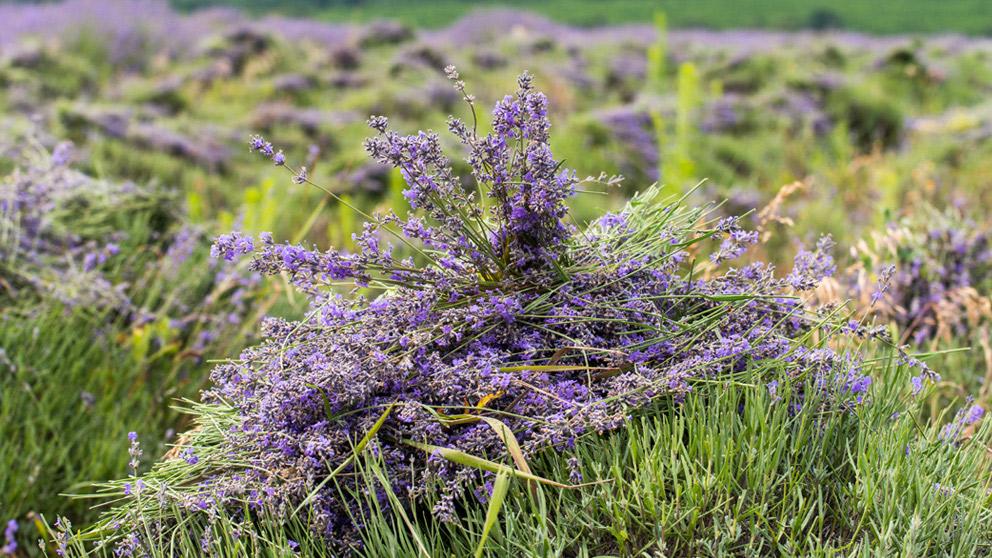
Natural fragrances
The expertise behind Weleda’s enchanting fragrance compositions
Weleda has been an expert in natural fragrances for over 100 years. At the company’s Fragrance Competence Center, in-house perfumers develop a wide range of sophisticated fragrance compositions using natural essential oils. Each fragrance is a work of art and the result of loving craftsmanship.
In-house fragrance expertise
Natural essential oils are our key competence. At Weleda, the fragrance is an integral part of our body care concepts. We develop all our fragrances at our in-house Fragrance Competence Center (FCC) in Arlesheim.
It is particularly important for Weleda to use only high-quality natural fragrance raw materials for its perfumes. From an anthroposophical point of view, a plant expresses its innermost being through its fragrance. We always encounter this essence in a natural fragrance composition.
Keeping the connection to nature and preserving the plants’ pure scents is therefore of central importance to us. For this reason, we work closely with the suppliers who distil the fragrant plants for our products. We support them in sustainable agriculture issues and the extraction of complex fragrances.
How are Weleda’s natural fragrance compositions created so that they have a harmonious, activating or inspiring effect? It requires not only craftsmanship in perfume development – but also extensive knowledge of the interaction of raw materials, their production, storage and further processing into body care products. To this end, Weleda employs an entire team of experts at the FCC, which is entirely dedicated to natural fragrances and the quality of their raw materials. In this interview, the fragrance experts share insight into their work.
How are new fragrances developed at Weleda? Who is involved?
At Weleda, fragrance development is a team effort. The first thing we do is create a description of the fragrance profile we want to make. It provides detailed answers to questions such as: What feelings should the fragrance trigger? What qualities do we want to promote? Then we think about how to create that fragrance. Do we need new fragrance elements, and if so, which ones? Olfactory impressions are intensely linked to personal memories and feelings and influenced by past experiences with particular scents. In addition, scent preferences can vary depending on a person’s age or stage in life. This makes the evaluation of a fragrance subjective. For this reason, we seek the opinion of people outside the development team who have a connection to the target group and can support our decision-making process.
Fragrance declaration
About 2,500 natural and synthetic substances are used as fragrances today. The European Union has identified 26 fragrance substances as the most common triggers of fragrance allergies. 16 of these are also found in essential oils, and 10 of these are only synthetically accessible, so Weleda does not use them.
Since 2005, cosmetic products containing any of those 26 fragrance allergens in relevant concentrations must declare their content on their packaging. Of course, Weleda states those substances on the packaging of its natural cosmetics products.
Although we use essential oils for our product fragrances, you will also find substances listed such as geraniol, benzyl benzoate or citral. Geraniol can be produced synthetically, but is also naturally present in geranium and rose essential oils. Citral is naturally found in lemon oil and lemongrass oil.
In Weleda cosmetics, those fragrance substances are present only as components of natural essential oils.
Each of our natural cosmetic projects includes a complete list of ingredients on its packaging, called the INCI list (International Nomenclature of Cosmetic Ingredients).
What determines the quality of a fragrance substance?
At Weleda, quality and sustainability go hand in hand.
Holistic fragrance development is inseparable from natural essential oils. That’s why Weleda invests heavily in sourcing high-quality, pure fragrance raw materials. We work closely with our partners who grow and distil fragrant plants. We support them in addressing issues like sustainable cultivation and the extraction of authentic fragrances. Our global cultivation projects are impressive examples of such collaborations. Before processing the raw materials for our products, Weleda checks every delivery in great detail. Important quality checks include the proper maturation of essential oils along with the transportation and storage of these valuable raw materials.
What is the difference between natural and artificial fragrance concepts?
One of the main pillars in the development of Weleda products – besides great care and expertise – is to use nature as a source of inspiration.
Humans have an intrinsic kinship with natural fragrances because they come from the same natural world. In the course of our lives, we gather experiences with scents and associate them – often unconsciously – with memories and feelings. Synthetic substances can also trigger such associations. However, natural fragrances are more layered and complex. Just imagine the familiar scent of someone close to you or the clear, fresh smell of a forest.
100 years of expertise in working with natural fragrances
We have been using pure and natural fragrances holistically since 1921, making us a pioneer in the field. These powerful substances are distilled, pressed or extracted from fruits, flowers, buds, leaves, woods and roots. Sophisticated analytical methods guarantee the quality of our natural fragrances.
Our fragrance philosophy:
- We use 100% pure and natural fragrances from aromatic plants (essential oils and extracts) because they are the essence of the plant kingdom.
- Fragrances evoke emotion and inspiration. In doing so, they touch our soul and spirit.
- They may not only act through the nose – scent receptors have also been found in the skin. In short, natural fragrances are beneficial and have a holistic effect – on skin, soul and spirit.










